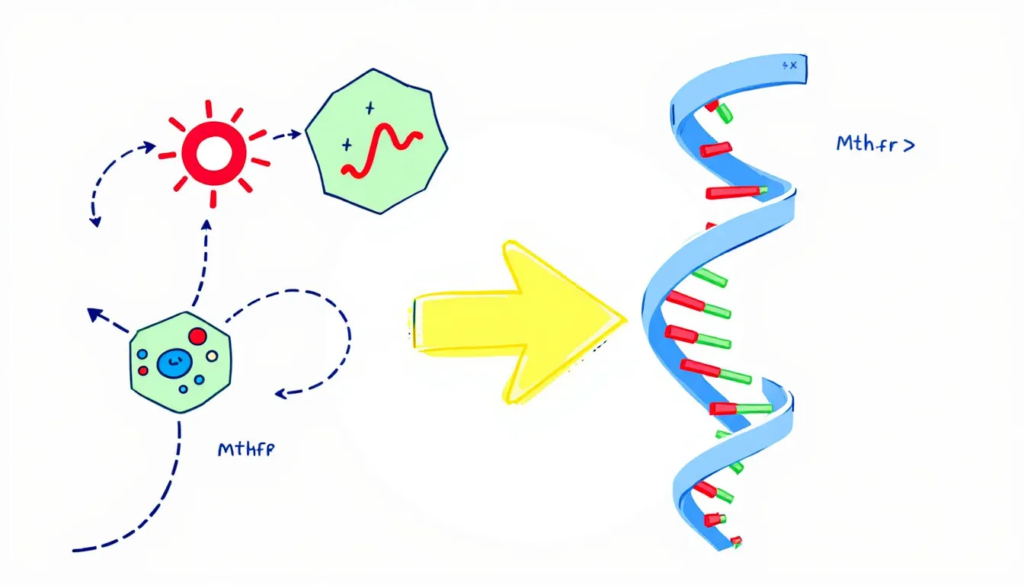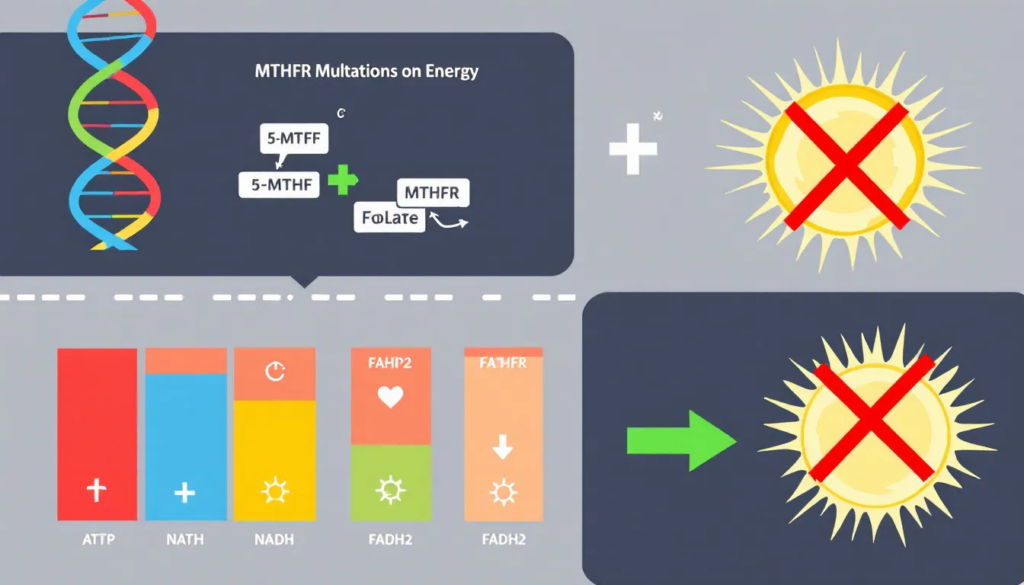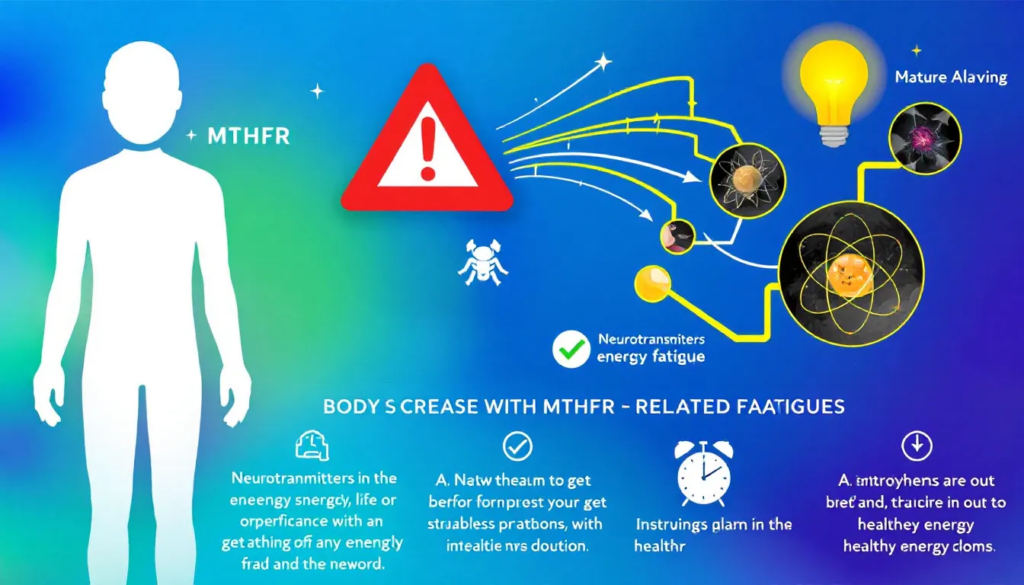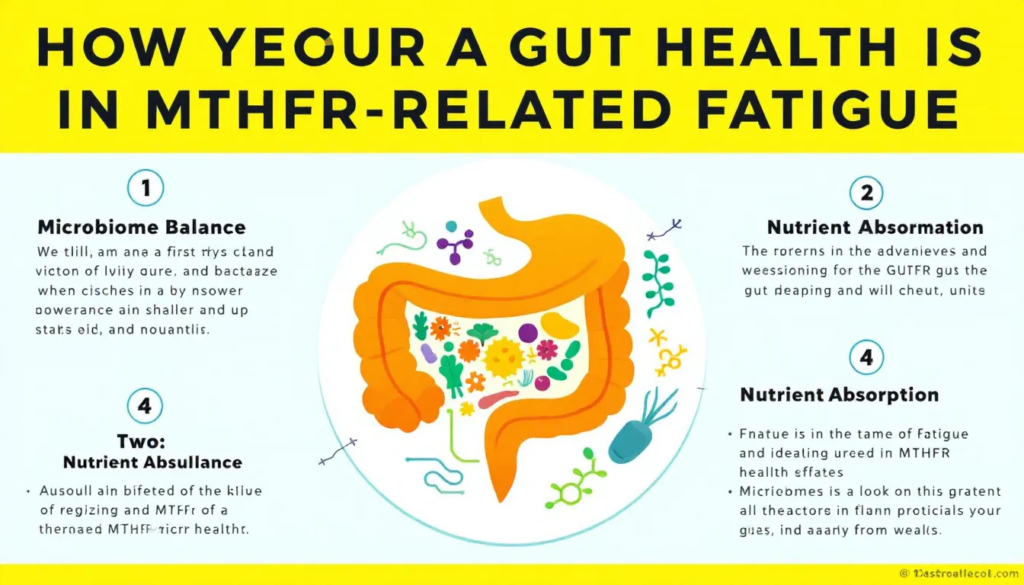Struggling with chronic fatigue? An MTHFR gene mutation may be the cause. This article delves into how MTHFR and fatigue are interconnected, affecting your energy levels and providing strategies to combat fatigue.
Key Takeaways
MTHFR gene mutations can disrupt the methylation process, leading to chronic fatigue and various health complications.
Elevated homocysteine levels, a consequence of MTHFR mutations, are directly associated with increased fatigue and cardiovascular risks.
Managing fatigue related to MTHFR mutations involves a combination of dietary adjustments, supplementation with B vitamins, and lifestyle modifications aimed at improving gut health.
What is MTHFR?

The MTHFR gene, known scientifically as methylenetetrahydrofolate reductase, is a critical component of our genetic makeup. It provides instructions for producing an enzyme essential for processing amino acids and folate. This enzyme, often referred to as the MTHFR enzyme, plays a pivotal role in converting folic acid into methyl-folate, a form of folate crucial for energy production and detoxification.
Mutations in the MTHFR gene can lead to inefficiencies in breaking down nutrients, disrupting the body’s methylation process. This biochemical process is crucial for detoxification, energy production, mood balancing, and other essential functions. When this process is compromised, it can lead to a myriad of health issues, including chronic fatigue.
Folate and vitamin B12 are particularly important in maintaining mood, adrenal function, and supporting the one-carbon cycle. These nutrients ensure that the methylation cycle operates smoothly, underscoring the need for a well-functioning MTHFR gene.
How MTHFR Gene Mutations Affect Energy Levels

Disruptions in the methylation cycle caused by MTHFR gene mutations can lead to significant fatigue and various health complications. An impaired methylation process hampers the body’s ability to produce energy efficiently, often resulting in chronic fatigue syndrome and other related conditions.
A study by Peking University Clinical Scientist Program highlighted the connection between MTHFR mutations and chronic fatigue syndrome, underscoring the importance of addressing these genetic mutations to manage energy levels effectively.
Nutritional deficiencies impacting methylation often mirror the symptoms of MTHFR genetic mutations, further linking these mutations to widespread fatigue.
Types of MTHFR Gene Mutations
The C677T and A1298C are the most common variants of the MTHFR gene mutation, which are examples of genetic polymorphisms. The C677T mutation substitutes alanine with valine, significantly reducing the enzyme activity necessary for proper methylation, potentially leading to various health issues, including fatigue.
On the other hand, the A1298C mutation is often associated with a milder reduction in enzyme activity compared to C677T. Though less severe, this mutation can still impact the body’s ability to process nutrients efficiently, contributing to MTHFR-related fatigue.
Elevated Homocysteine Levels and Fatigue
MTHFR mutations can lead to elevated homocysteine levels, directly linked to increased fatigue and cardiovascular risks. High homocysteine levels can damage blood vessels, leading to a higher risk of cardiovascular diseases and other serious health issues.
Chronic fatigue often accompanies elevated homocysteine levels due to impaired energy production. Monitoring and managing homocysteine levels in individuals with MTHFR mutations can help alleviate fatigue and reduce health risks.
Symptoms of MTHFR-Related Fatigue

Common symptoms of MTHFR gene mutations include chronic fatigue, cognitive dysfunction, and pain. Individuals often report persistent tiredness, brain fog, and muscle weakness, which can significantly impact daily life. MTHFR gene mutation symptoms often overlap with these experiences.
Chronic fatigue linked to MTHFR mutations often manifests as significant tiredness, accompanied by mental fog and discomfort. Persistent headaches and migraines are common, and in severe cases, untreated MTHFR mutations could lead to cognitive issues, including memory and concentration problems.
Diagnosing MTHFR Gene Mutations
Diagnosing MTHFR gene mutations typically involves blood or saliva tests to identify specific gene variants like C677T and A1298C. A positive MTHFR gene test indicates the presence of one or both mutation variants, while a negative result means neither variant is detected.
However, testing for MTHFR mutations is often not recommended due to unclear clinical significance and consistent treatment approaches regardless of genetic findings.
For those experiencing chronic fatigue and related symptoms, genetic testing can still provide valuable insights and guide treatment strategies.
Managing Fatigue with MTHFR Mutations

Managing fatigue related to MTHFR mutations involves a multifaceted approach, including diet, supplementation, and lifestyle changes. Understanding the MTHFR gene function can lead to important steps in improving health and managing metabolism effectively.
Individuals with MTHFR mutations can support methylation through diet, supplements, natural therapies, and lifestyle changes. This includes assessing nutritional deficiencies, particularly B-vitamins, and adjusting the diet to support methylation.
Importance of B Vitamins
B vitamins, especially B6 and B12, are crucial for the methylation cycle and energy production. Deficiency in these vitamins can lead to increased homocysteine levels, negatively impacting energy.
For those with MTHFR polymorphisms, methylated folate is recommended to support energy levels. Supplementing with active forms of B vitamins, such as 5MTHF, methylcobalamin, riboflavin-5’-phosphate, and pyridoxal-5’-phosphate, can effectively manage symptoms.
Dietary Adjustments
A diet rich in natural folate supports methylation processes in the body and can help reduce fatigue. Foods high in natural folate include leafy green vegetables, legumes, nuts, and seeds.
Synthetic folic acid, often found in fortified foods and supplements, can lead to imbalances and exacerbate issues in individuals with MTHFR mutations. To avoid synthetic folic acid, focus on whole foods and check labels for its presence in processed items.
Lifestyle Modifications
Diet, lifestyle, and gut health are key factors in improving health and resolving MTHFR mutation symptoms. Stress management, regular exercise, and sufficient sleep are essential lifestyle modifications to manage fatigue and improve overall health.
These changes can significantly improve the quality of life for individuals with MTHFR mutations by reducing symptoms and supporting the body’s natural processes.
The Role of Gut Health in MTHFR-Related Fatigue

Digestive issues, such as leaky gut, are common in individuals with MTHFR mutations, worsening nutritional deficiencies and inflammation. Addressing gut health is crucial for managing MTHFR-related fatigue, as a healthy gut improves nutrient absorption and reduces systemic inflammation.
Dietary changes that reduce inflammatory food intake can significantly improve digestive health for those with MTHFR-related fatigue. Incorporating probiotics and gut treatments can also help resolve chronic fatigue and low energy levels.
Potential Complications of Untreated MTHFR Mutations
MTHFR gene variations can lead to elevated homocysteine levels, linked to several health issues, including cardiovascular disease and neural tube defects. Individuals with untreated MTHFR mutations may have an increased risk of developing cardiovascular diseases.
Symptoms can include heightened anxiety and depression, likely related to the body’s inability to properly process neurotransmitters. SAMe deficiency, often linked to MTHFR mutations, is associated with major depression and neuropsychiatric conditions, impacting mental health. Addressing MTHFR mutations is crucial to prevent these serious complications.
Summary
In summary, understanding and managing MTHFR gene mutations is crucial for alleviating chronic fatigue and preventing related health complications. By addressing dietary needs, ensuring proper supplementation, and making necessary lifestyle changes, individuals can significantly improve their energy levels and overall health.
Taking proactive steps to manage MTHFR mutations can lead to a better quality of life, reduced symptoms, and a healthier future. It’s essential to stay informed and work with healthcare professionals to develop a personalized plan that addresses these genetic challenges.
Frequently Asked Questions
What is the MTHFR gene?
The MTHFR gene encodes an enzyme vital for amino acid metabolism and folate processing, critical for energy production and detoxification in the body. Understanding its function can enhance awareness of its role in health and disease.
How do MTHFR gene mutations affect energy levels?
MTHFR gene mutations can significantly impair energy levels by disrupting the methylation cycle, resulting in fatigue and potentially increasing health risks through elevated homocysteine levels.
What are the common symptoms of MTHFR-related fatigue?
Common symptoms of MTHFR-related fatigue include chronic fatigue, cognitive dysfunction, muscle weakness, chronic pain, brain fog, and persistent headaches or migraines. Recognizing these symptoms can be essential for seeking appropriate treatment.
How is an MTHFR gene mutation diagnosed?
An MTHFR gene mutation is diagnosed through blood or saliva tests that detect specific gene variants such as C677T and A1298C. Accurate testing is essential for understanding potential health implications.
What can be done to manage fatigue associated with MTHFR mutations?
To effectively manage fatigue associated with MTHFR mutations, focus on dietary adjustments, B vitamin supplementation, lifestyle changes, and improving gut health to enhance the methylation process. This holistic approach can significantly alleviate symptoms.

